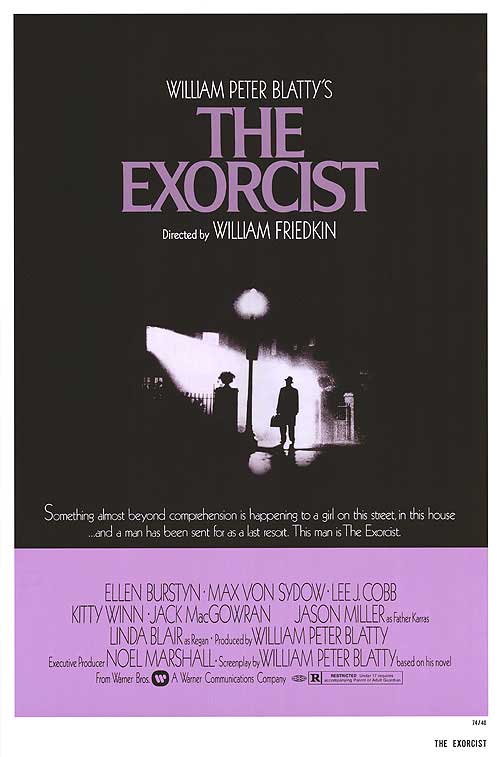
THE EXORCIST is probably the scariest horror film ever made. Is that even in debate? (Wink, wink.) We’re on the internet here. Everything’s in debate, constantly. And no one — no one — has seen every movie ever made, so it’s meaningless to call any one movie the best one ever. Still, off the top of your head, just try to name a scarier movie. Nothing? Off the bottom of your head then. No? How about off the top of your butt?
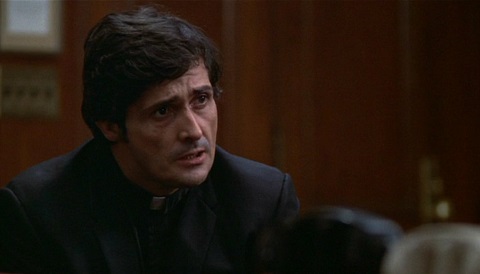
I’m starting off like a jackass because it’s easier than admitting how spooked I am by THE EXORCIST. As befits someone who’s seen many, many dozens of horror movies, I’m not easy to frighten. There are only a few things on the planet that genuinely unnerve me, and THE EXORCIST taps into several of them. Much has been written about the upper-class world of Georgetown in this movie, where malevolent forces invade without mercy. Ellen Burstyn’s character Chris MacNeil is a successful actress, in town to shoot a movie. She lives in a house with her pre-adolescent daughter Regan — Linda Blair in one of the greatest and most infamous performances ever given by a child actor — and it’s worth nothing that the house is too big for the two of them. Chris fills the space with high-society parties, attended by recognizable archetypes such as the charmingly louche British director played by Jack McGowran, but no one in that world is remotely prepared to deal with what’s coming.

Again, most of the writing about THE EXORCIST center around Chris MacNeil’s dilemma, and quite rightly, since it is the plot of William Peter Blatty’s story. But to me, the story arc of the film’s foremost supporting character is even more compelling. Let’s look at how he gets there. Young Regan is possessed by a demon named Pasuzu — no medical treatment can attack the problem, and even the eventual spiritual approach requires reinforcements (which fail, technically). Chris MacNeil isn’t a religious believer, nor is Regan, and the priest who initially consults with Chris has recently suffered a crisis of faith. His name is Damien Karras — and isn’t it a strange coincidence that three years later, a character named Damien arrived in the form of the Anti-Christ? That’s neither here nor there; Karras is a good man, having tended to his frail mother for a long time before she dies, early on in the film. Prayer didn’t relieve her suffering, and so Karras’s trust in God has wavered. In other words, it isn’t like the gung-ho can-do John Wayne of Catholicism has been called up to bat here. Karras goes to the bishop, who calls in Father Merrin, a priest of unshakable belief who has experience with exorcisms in general and the matter of Pasuzu in particular.
In a sly bit of casting, Merrin arrives in the form of the man who played the Knight in Ingmar Bergman’s THE SEVENTH SEAL, a character who defied Death, and not only that, but he also played Jesus Christ in THE GREATEST STORY EVER TOLD. The cavalry brought in the big cannon, right? Doesn’t work.
Age and strain lead to Pasuzu’s mortal defeat of Merrin. It falls back to Karras. Karras has a weakness, and Pasuzu has already exploited it, speaking to him in his mother’s voice, telling him how she is experiencing eternal torment and there’s nothing he can do about it. (The actual dialogue is extremely different and pretty notorious, but you can look it up.) In the end Karras offers himself up to Pasuzu, and once Regan is free of the demon, once he himself is the vessel it occupies, Karras throws himself to his death. The demon is banished from the realm, and in its final moments the movie even offers up a comparatively friendly, CASABLANCA-style scene between Detective Kinderman and Father Dyer, a friend of Father Karras. It’s sad that Karras is gone but a meager reassurance that the skeptic and the faithful have reconciled.
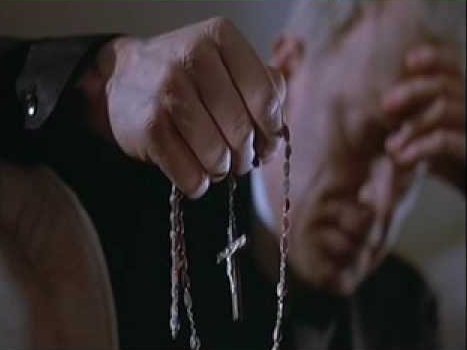
All that I have described of the plot is high drama, perfectly established and executed by top-flight filmmakers at the height of their powers. THE EXORCIST a great film regardless of genre, and as a horror film, it achieves its purpose immaculately: It’s scary as all hell. We all know about the voices, and the sound design, and the demon’s face, and the contortions, and the projectile vomiting. The horror gags in THE EXORCIST were so innovative and meticulously mounted that horror films have been replicating them, in all kinds of forms, for decades now. That said, however, and as much as I love the horror genre, THE EXORCIST isn’t one of my favorite movies, because how could it be? I don’t find it pleasing. I don’t like to revisit it. It’s very, deeply unsettling to me, and that goes beyond all the very effective scares onscreen. There’s something about this movie that is chilling down to the very soul. It haunts.
That’s due to the much-acknowledged cinematic mastery of William Friedkin and legendary camera-genius Owen Roizman, and the unforgettable performances of the imperious Max Von Sydow, tough-talking Lee J. Cobb as the practical-minded detective looking into the unexplained deaths that spring up around Regan, and, especially, Jason Miller, who is so expressive and sad as the anguished Father Karras – but it’s also due to the idea at the cold heart of the movie, which I am about to unload. What happens on screen is disturbing enough, but the elemental notions behind the onscreen events go beyond disturbing to become upsetting on a psychological and intellectual level. Most great horror films have their way with your emotions for two hours and then let you go. This one refuses to leave you. It lingers long after the time it takes to watch it. Here goes…
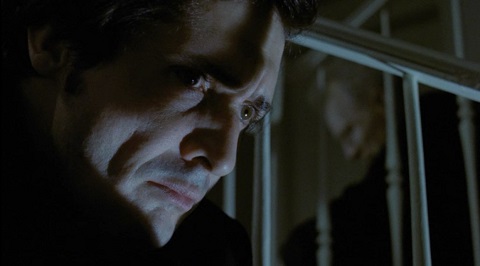
At the start of the story, Father Karras has lost his faith. He gets it back at the end: Not because he learns God exists, but because he sees the Devil does. It takes the greatest evil to prove that the converse is also true. That is about as dark a statement as I can imagine, so goddamn bleak and anti-spiritual, so bereft of uplift. There is ultimately no external force of good that saves the day in the final reel; there is only death. Karras sacrifices his own life to save Regan, and only then does the nightmare end, with no promise that Karras’ death, a valiant tragedy, was anymore than the proverbial finger in the dam. Regan MacNeil will recover, but Chris MacNeil is forever traumatized, having been helpless to protect her daughter. The callous defilement of the domestic sphere is such a relatable nightmare that THE EXORCIST evokes near-universal empathy and terror; compounded with the death of Karras’ mother, the film is a potent reminder that we are all constantly an arm’s length away from the greatest pain and loss. Death is a Sword Of Damocles in every human life, and introducing paranormal machinations of cruelty only makes the sting of that fact worse.
The idea that there are cruel forces far more powerful than us, that we will fail before them attempting to protect our children and our elderly, that evil exists but faith and decency won’t save you: All of these notions I find profoundly troubling, personally. These are the only things I personally can possibly fear — not movies, not monsters, not man, not death itself, but those ideas, the ideas explored in THE EXORCIST and almost nowhere else in culture at large, that is what frightens me. So that’s why I argue for this one film as the scariest of all.
THE EXORCIST plays this afternoon and tonight at BAMcinématek as part of a film series honoring the work of Ellen Burstyn.
— JON ABRAMS (@jonnyabomb).
- [THE BIG QUESTION] WHAT’S YOUR FAVORITE FEMALE ENSEMBLE IN MOVIES? - July 22, 2016
- [IN THEATERS NOW] THE BOY (2016) - January 24, 2016
- Cult Movie Mania Releases Lucio Fulci Limited Edition VHS Sets - January 5, 2016
Tags: Horror, Screenings, William Friedkin

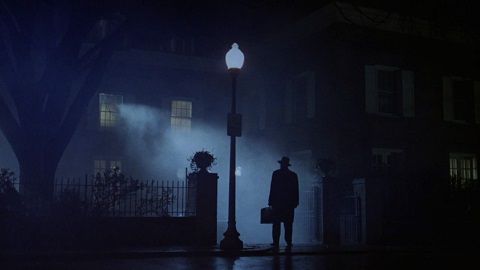




No Comments